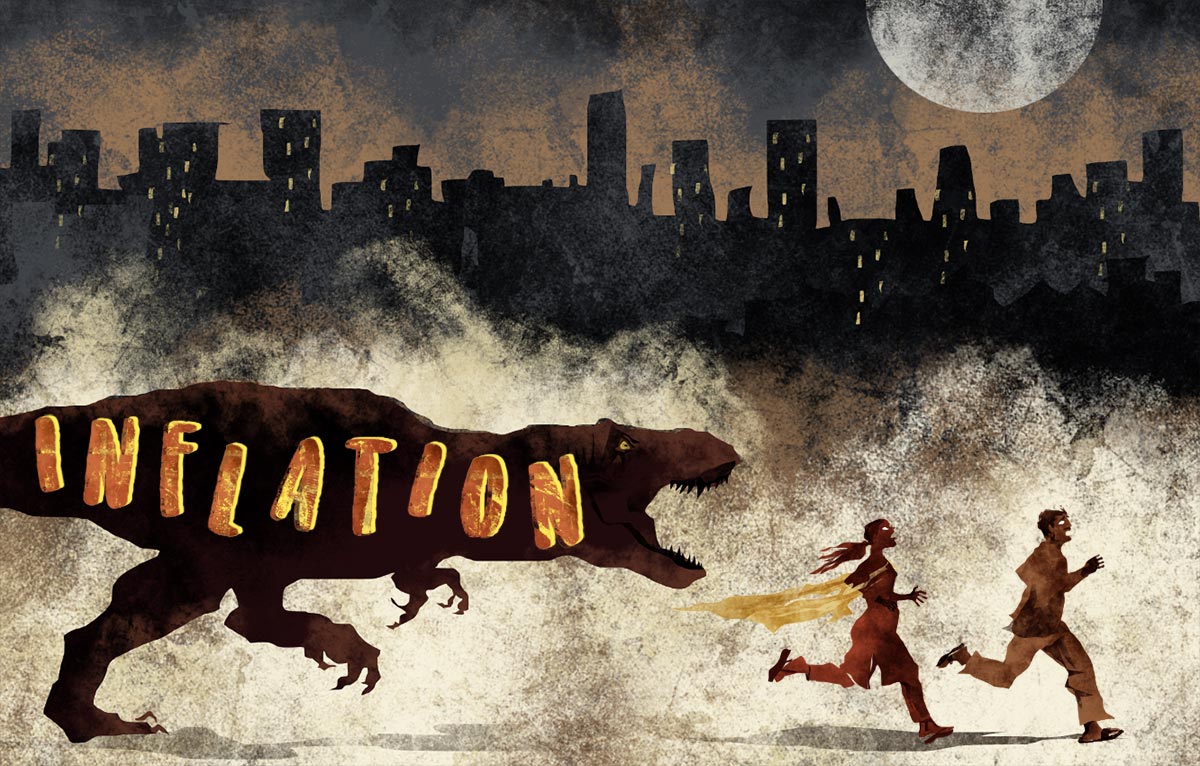Stock Markets Unconcerned About Inflation
We have not suffered such huge price shocks across so many basic commodities, at the same time, in decades.
Has the inflationary impact of all this been factored into stock prices as yet, asks Debashis Basu.
Recently, the market indices put up a strong one-day rally, supposedly in reaction to the Bharatiya Janata Party’s victories in four state assembly elections.
While huge relief rallies are natural in bear markets (the indices zigzag their way down), this one was a surprise.
After all, the markets have not been declining because of the BJP’s diminishing dominance.
Stock indices were tumbling because of much larger global issues — a series of supply shocks over several months that have led to higher inflation, possible interest rate hikes, and finally the Russian invasion of Ukraine.
In the face of such an overwhelming global tide, any rally, that too one that is driven by insignificant local political factors, can only mean that the market is unconcerned about the big looming threat — the monster of inflation.
The Indian stock markets began to slide from mid-October, when US inflation rates rose sharply.
It was feared that persistently high inflation would force the US Federal Reserve to hike interest rates several times this year and reduce monetary liquidity.
Such a move by the Fed would eliminate the monetary support that stock prices and many businesses have enjoyed in the post-Covid period.
When the Fed sneezes, emerging markets catch a cold.
It was, therefore, no surprise that the Indian markets came under pressure as foreign investors stepped up their selling.
The inflation outlook has worsened significantly since then.
Russia’s invasion of Ukraine has only added to the inflation fire.
Crude oil immediately went on the boil and Chicago’s benchmark wheat prices shot up by 40 per cent.
Global food inflation rates, which were already the highest in a decade, have risen further.
Russia and Ukraine together account for 30 per cent of world wheat exports and 20 per cent of corn exports.
The Black Sea region makes up more than 30 per cent of global trade in wheat, 32 per cent in barley, 17 per cent in corn, and more than 50 per cent in oilseeds.
That is why it is called the ‘breadbasket of the world’.
Higher wheat and cooking oil prices will affect almost the entire the world.
Africa and West Asia will be particularly affected.
Looking back, in the past six months we have seen the following waves of supply disruption: First gas prices in Europe rose; now oil prices across the world have gone up; and then a rise in prices of coal, foodgrain, and metals, including a parabolic rise in nickel, leading to a suspension of trading on the London Metal Exchange.
Germany reported the highest wholesale price inflation in three decades.
We have not suffered such huge price shocks across so many basic commodities, at the same time, in decades.
Has the inflationary impact of all this been factored into stock prices as yet?
Markets fall (or rise) in a big way when they are hit by sudden surprises.
These can be of two kinds. One is surprises that affect a small segment or have a temporary impact.
These do not affect the earnings of companies, and, after an initial dip, good-quality stocks resume their upward journey.
A good example is any change in the political regime.
When the rightwing Vajpayee government was defeated by a Congress-led left-leaning coalition, the markets crashed on May 14, 2004 and May 17, 2004.
But they started rising again and never breached the low of May 17; they even reached an all-time high before the end of the year, as investors realised that economic reforms would continue and corporate earnings would not be affected.
Another example is economic policy that creates terrible short-term disruption, like demonetisation, but does not harm companies much.
The second kind of surprise is a nasty, long-lasting one that fundamentally affects the economics of many businesses.
Sales and earnings are affected for several quarters or years together.
The surprise can be in the form of financial excesses getting corrected, high interest rates, and inflation.
Since the fall of the Berlin Wall, implosion of the former Soviet Union and Eastern Europe, and the extraordinary rise of China, most of the world has not really suffered from high inflation.
Prices have dropped continuously, productivity has risen, and trade has flourished.
Economies of scale and cheap labour in Asia and Eastern Europe steadily brought down costs across the globe.
This paradigm of progress is not over. But the worry now is whether supply shocks will maim the earning power of all sectors, except the commodities, for several quarters.
If the war with Ukraine is prolonged, prices of many commodity products will remain elevated.
This sets up a self-reinforcing cycle, as inflation begets inflation, and policymakers race to control it with successive rate hikes.
US Treasury Secretary Janet Yellen said, ‘We are likely to see another year in which 12-month inflation numbers remain very uncomfortably high.’
Persistent or sticky inflation will dent the economies of many businesses, as the purchasing power of consumers and profits of businesses shrink.
And while citizens and businesses adjust to reduced purchasing power and profits, don’t forget that an extractive State in developing countries never adjusts — it uses its power to take its share of the shrinking pie in the forms of taxes, cess, levies, etc, stoking inflation further.
This can be hard on investors. For a decade between 1994 and 2004, some of best-run Indian companies like Hindustan Unilever struggled to deliver returns higher than the ones of bank deposits.
The main reason was reduced purchase as people were struggling to cope with high inflation and high interest rates.
Debashis Basu is the editor of moneylife.in
Feature Presentation: Aslam Hunani/Rediff.com
For all the latest business News Click Here

